interest, interested, interesting用法介绍_用法辨析 英语语法.doc
interest, interested, interesting用法介绍
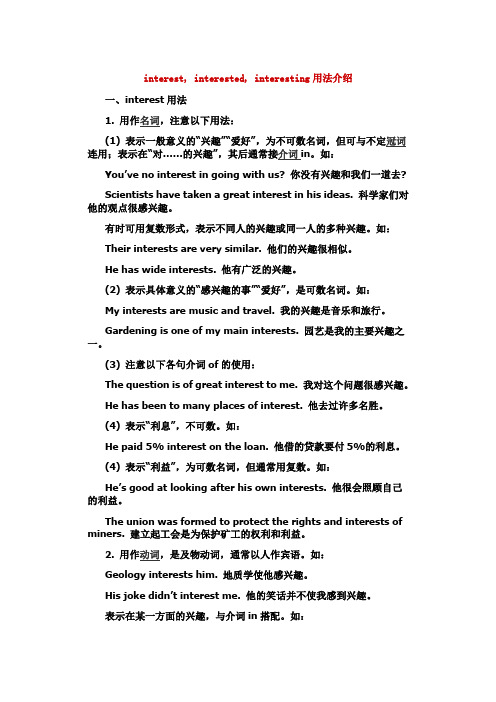
interest, interested, interesting用法介绍一、interest用法You’ve no interest in going with us? 你没有兴趣和我们一道去?Scientists have taken a great interest in his ideas. 科学家们对他的观点很感兴趣。
有时可用复数形式,表示不同人的兴趣或同一人的多种兴趣。
如:Their interests are very similar. 他们的兴趣很相似。
He has wide interests. 他有广泛的兴趣。
(2) 表示具体意义的“感兴趣的事”“爱好”,是可数名词。
如:My interests are music and travel. 我的兴趣是音乐和旅行。
Gardening is one of my main interests. 园艺是我的主要兴趣之一。
(3) 注意以下各句介词of的使用:The question is of great interest to me. 我对这个问题很感兴趣。
He has been to many places of interest. 他去过许多名胜。
(4) 表示“利息”,不可数。
如:He paid 5% interest on the loan. 他借的贷款要付5%的利息。
(4) 表示“利益”,为可数名词,但通常用复数。
如:He’s good at looking a fter his own interests. 他很会照顾自己的利益。
The union was formed to protect the rights and interests of miners. 建立起工会是为保护矿工的权利和利益。
Geology interests him. 地质学使他感兴趣。
His joke didn’t interest me. 他的笑话并不使我感到兴趣。
七年级英语下人教版 Unit3词语辨析
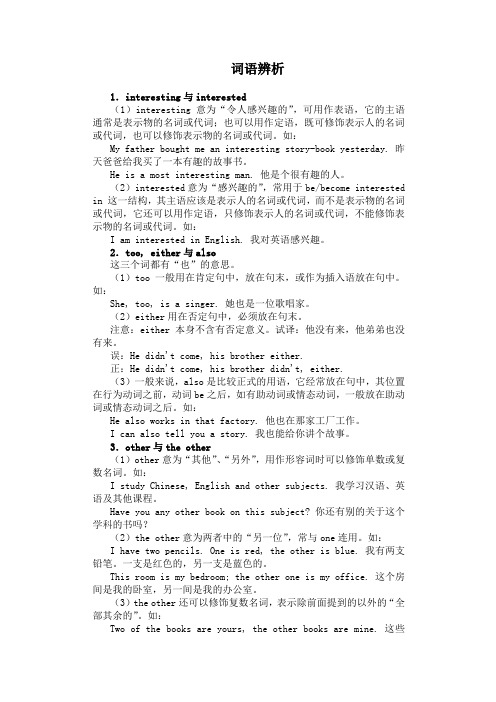
词语辨析1.interesting与interested(1)interesting 意为“令人感兴趣的”,可用作表语,它的主语通常是表示物的名词或代词;也可以用作定语,既可修饰表示人的名词或代词,也可以修饰表示物的名词或代词。
如:My father bought me an interesting story-book yesterday. 昨天爸爸给我买了一本有趣的故事书。
He is a most interesting man. 他是个很有趣的人。
(2)interested意为“感兴趣的”,常用于be/become interested in 这一结构,其主语应该是表示人的名词或代词,而不是表示物的名词或代词,它还可以用作定语,只修饰表示人的名词或代词,不能修饰表示物的名词或代词。
如:I am interested in English. 我对英语感兴趣。
2.too, either与also这三个词都有“也”的意思。
(1)too一般用在肯定句中,放在句末,或作为插入语放在句中。
如:She, too, is a singer. 她也是一位歌唱家。
(2)either用在否定句中,必须放在句末。
注意:either本身不含有否定意义。
试译:他没有来,他弟弟也没有来。
误:He didn't come, his brother either.正:He didn't come, his brother didn't, either.(3)一般来说,also是比较正式的用语,它经常放在句中,其位置在行为动词之前,动词be之后,如有助动词或情态动词,一般放在助动词或情态动词之后。
如:He also works in that factory. 他也在那家工厂工作。
I can also tell you a story. 我也能给你讲个故事。
3.other与the other(1)other意为“其他”、“另外”,用作形容词时可以修饰单数或复数名词。
interest、interesting和interested的区别
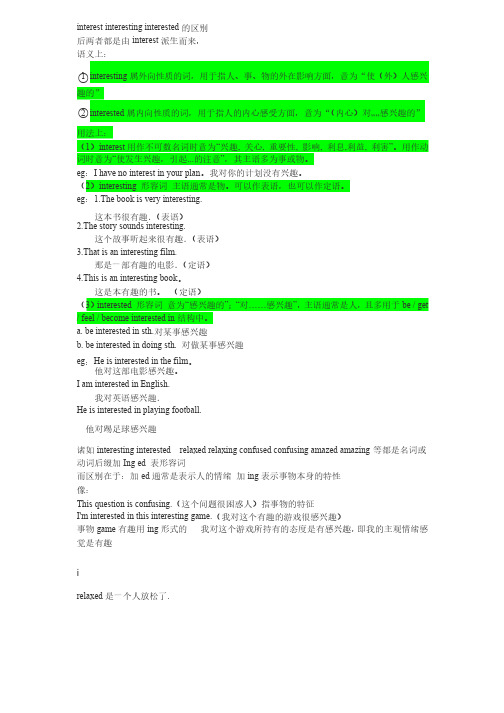
interest interesting interested的区别后两者都是由interest派生而来,语义上:○1interesting属外向性质的词,用于指人、事、物的外在影响方面,意为“使(外)人感兴趣的”○2interested属内向性质的词,用于指人的内心感受方面,意为“(内心)对……感兴趣的”用法上:(1)interest用作不可数名词时意为“兴趣, 关心, 重要性, 影响, 利息,利益, 利害”。
用作动词时意为“使发生兴趣,引起...的注意”,其主语多为事或物。
eg:I have no interest in your plan。
我对你的计划没有兴趣。
(2)interesting 形容词 主语通常是物。
可以作表语,也可以作定语。
eg:1.The book is very interesting.这本书很有趣.(表语)2.The story sounds interesting.这个故事听起来很有趣.(表语)3.That is an interesting film.那是一部有趣的电影.(定语)4.This is an interesting book。
这是本有趣的书。
(定语)(3)interested 形容词 意为“感兴趣的”;“对……感兴趣”,主语通常是人,且多用于be / get / feel / become interested in结构中。
a. be interested in sth.对某事感兴趣b. be interested in doing sth. 对做某事感兴趣eg:He is interested in the film。
他对这部电影感兴趣。
I am interested in English.我对英语感兴趣.He is interested in playing football.他对踢足球感兴趣诸如interesting interested relaxed relaxing confused confusing amazed amazing等都是名词或动词后缀加Ing ed 表形容词而区别在于:加ed通常是表示人的情绪 加ing表示事物本身的特性像:This question is confusing.(这个问题很困惑人)指事物的特征I'm interested in this interesting game.(我对这个有趣的游戏很感兴趣)事物game有趣用ing形式的 我对这个游戏所持有的态度是有感兴趣,即我的主观情绪感觉是有趣irelaxed是一个人放松了.eg. i felt relaxed after my exam.relaxing是形容环境等等的.eg. walking along the beach is a relaxing experience.。
interesting和interested例句
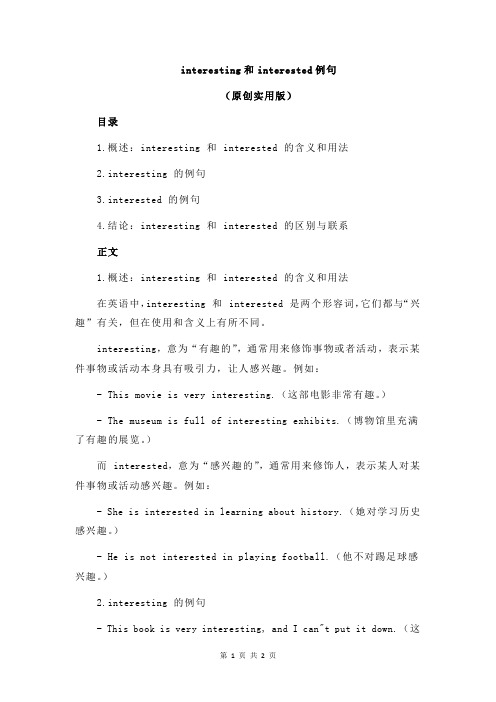
interesting和interested例句(原创实用版)目录1.概述:interesting 和 interested 的含义和用法2.interesting 的例句3.interested 的例句4.结论:interesting 和 interested 的区别与联系正文1.概述:interesting 和 interested 的含义和用法在英语中,interesting 和 interested 是两个形容词,它们都与“兴趣”有关,但在使用和含义上有所不同。
interesting,意为“有趣的”,通常用来修饰事物或者活动,表示某件事物或活动本身具有吸引力,让人感兴趣。
例如:- This movie is very interesting.(这部电影非常有趣。
)- The museum is full of interesting exhibits.(博物馆里充满了有趣的展览。
)而 interested,意为“感兴趣的”,通常用来修饰人,表示某人对某件事物或活动感兴趣。
例如:- She is interested in learning about history.(她对学习历史感兴趣。
)- He is not interested in playing football.(他不对踢足球感兴趣。
)2.interesting 的例句- This book is very interesting, and I can"t put it down.(这本书非常有趣,我放不下它。
)- The lecture was interesting, and I learned a lot.(这个讲座很有趣,我学到了很多。
)- The interesting thing about this game is that it requires a lot of strategy.(这个游戏的有趣之处在于,它需要很多的策略。
interest,interested,interesting的用法

Interest的用法(1)、interest 作及物动词。
①interest sb、意为“使某人感兴趣,引起某人注意”。
如:Geography doesn’t interest him、地理引不起她的兴趣。
②interest sb、in (doing) sth、意为“使某人在……方面感兴趣”。
如:He tried to interest me in buying the house、她想说服我买这所房子。
(2)、interest作名词。
①意为“兴趣”时,常作不可数名词。
常见短语show / have/take interest in (doing) sth、,意为“对……表现出/ 有兴趣”。
如:She showed great interest in the meeting、她对这次会议表现出极大的兴趣。
have no interest in…对…、不感兴趣eg: I have no interest in collecting stamps、lose interest in…对…失去兴趣eg: I lost interest in music、我对音乐失去了兴趣。
with interest 兴致勃勃的eg: I read this book with interest、②意为“业余爱好”或“感兴趣的事”时,常作可数名词。
如:He has two great interests、One is sport s and the other is music、她有两大爱好:一个就是体育,另一个就是音乐。
3、interested就是形容词,常用结构be interested in (doing) sth、意为“对(做)……感兴趣”,主语就是人。
如:John is interested in history、约翰喜欢历史。
He is interested in drawing pictures、她对画画感兴趣。
Unit11一、 interesting,interested,interest的区别

Bye bye!
Hale Waihona Puke 练习:用interesting, interest或interested填空: 1. Her sister is______ in TV. 2. Learning new languages is one of my interests 3. I am______ in English. That is an______ film. 4. He is______ in playing football. 5. The story can______ these children. 6. Mary takes an______ in sports. 7. This story sounds______ , but I don’t in it. 8. Li Hong shows______ in basketball. 9. 10. I am trying to______ my students in class.
3、interested“令人感兴趣的”,为形容 词,主语一般为人,表示人们能体会到或 感受到某种趣味。固定搭配: (1)be/get/feel/become interested in “对... ...感兴趣” 例:He is/gets/feels/becomes interested in the film. (2) be interested in doing sth. 对做某事感兴趣 例:I am interested in learning new languages.
Unit11How was your school trip? 一、interesting, interest与 interested的区别:
三者都有“感兴趣”的意思。 1、interest (1)作名词 “兴趣、爱好、关心、重要性、影响、 利/息/益/害”。表类别时可数;表喜好时不可数。 固定搭配:show interest in/take an interest in对... ...感兴趣 例: 兴 I have no interest in your plan. 趣 She shows much interest in music. 不可数 The students have different interests in our school. (类别可数) 作动词 “使发生兴趣,引起...的注意”。 例:Football doesn’t interest me at all. 2、interesting“有趣的、令人感兴趣的”,为形容词, 主语一般是物,表示事物本身具有使人感兴趣、 引人注目之处。 例:This film is interesting.(这部电影令人感兴趣)。 It’s an interesting book.
北师大版(一起)-英语-五年级下册-Unit 10 Buying a book--interesting与interested

电影太乏味了。 ② I’m bored with so many boring things. 我厌倦了乏味的事情。
再如:exciting 令人兴奋的,激动人心的 an exacting news 一个激动人心的消息, excited兴奋的 He is excited at the news.
2)interesting 形容词 主语通常是物。
可以作表语,也可以作定语。
eg:1. The book is very interesting. 这本书很有趣。(表语) 2. The story sounds interesting. 这个故事听起来很有趣。(表语) 3. That is an interesting film. 那是一部有趣的电影。(定语) 4. This is an interesting book。 这是本有趣的书。(定语)
3)interested 形容词意为“感兴趣的”; “对……感兴趣”,主语通常是人,且多用 于be / get / feel / become interested in结构 中。 a. be interested in sth 对某事感兴趣 b. be interested in doing sth 对做某事感兴 趣 eg:He is interested in the film. 他对这部电影感兴趣。
2)bored为bore的过去分词形式,意思是 “感到厌烦的”, 修饰人,做表语或定语。 如:
① I’m bored. Let’s go to the cinema.
② I hope you’re not getting bored of my conversation.
3)boring 为表示主动意义的形容词,有 “令人厌烦”的意思,多作定语与表语, 修饰物。如:
interest,interested,interesting用法介绍
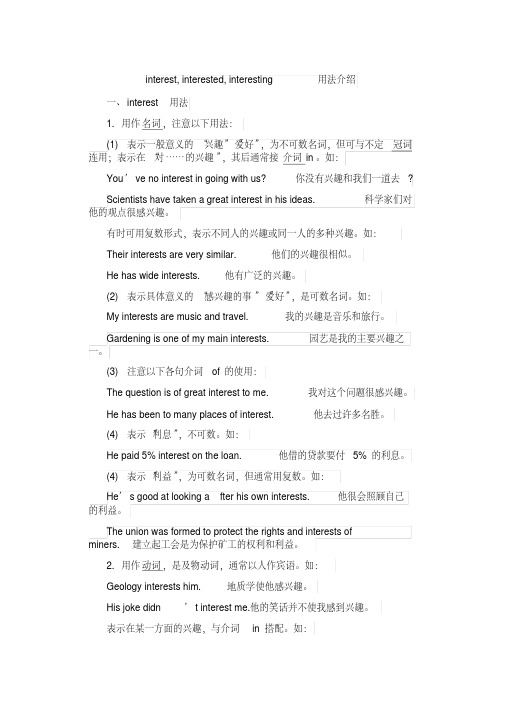
interest, interested, interesting用法介绍一、interest用法1. 用作名词,注意以下用法:(1) 表示一般意义的“兴趣”“爱好”,为不可数名词,但可与不定冠词连用;表示在“对……的兴趣”,其后通常接介词in。
如:You’ve no interest in going with us? 你没有兴趣和我们一道去?Scientists have taken a great interest in his ideas. 科学家们对他的观点很感兴趣。
有时可用复数形式,表示不同人的兴趣或同一人的多种兴趣。
如:Their interests are very similar. 他们的兴趣很相似。
He has wide interests. 他有广泛的兴趣。
(2) 表示具体意义的“感兴趣的事”“爱好”,是可数名词。
如:My interests are music and travel. 我的兴趣是音乐和旅行。
Gardening is one of my main interests. 园艺是我的主要兴趣之一。
(3) 注意以下各句介词of的使用:The question is of great interest to me. 我对这个问题很感兴趣。
He has been to many places of interest. 他去过许多名胜。
(4) 表示“利息”,不可数。
如:He paid 5% interest on the loan. 他借的贷款要付5%的利息。
(4) 表示“利益”,为可数名词,但通常用复数。
如:He’s good at looking a fter his own interests. 他很会照顾自己的利益。
The union was formed to protect the rights and interests ofminers. 建立起工会是为保护矿工的权利和利益。
英语单词interest的用法

英语单词interest的用法
“interest”是一个英语单词,它可以用作名词或动词,意思是“兴趣”、“爱好”、“利益”等。
以下是一些常见的用法:
1. 作为名词:
* 表示“兴趣”、“爱好”。
例如:I have a great interest in music.(我对音乐有很大的兴趣。
)
* 表示“利益”。
例如:The company was founded to promote the interests of the local community.(公司成立旨在促进当地社区的利益。
)
2. 作为动词:
* 表示“使产生兴趣”、“使感兴趣”。
例如:The new product will interest customers.(新产品将使顾客感兴趣。
)
* 表示“影响”、“干涉”。
例如:The decision will not interest their financial situation.(这个决定不会影响他们的财务状况。
)
* 表示“使感兴趣”。
例如:The event will interest all who attend.(这次活动将使所有参加者感到兴趣。
)
此外,“interest”还可以与其他单词组合使用,例如:“interested”(感兴趣的)、“interesting”(有趣的)、“interestingly”(有趣地)等。
interested 形容词
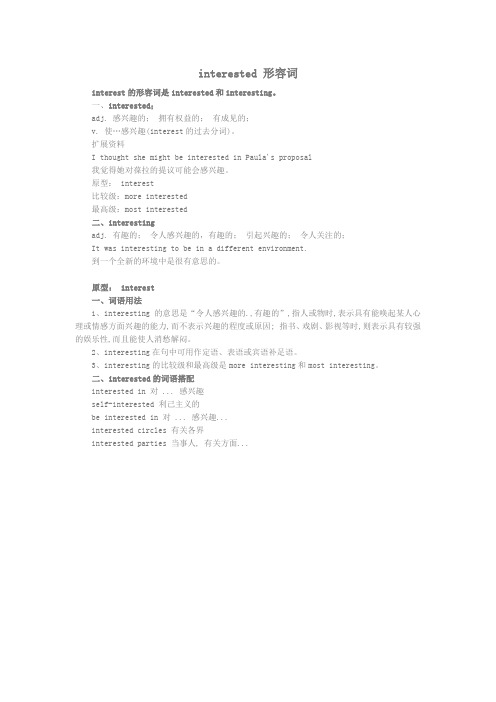
interested 形容词interest的形容词是interested和interesting。
一、interested;adj. 感兴趣的;拥有权益的;有成见的;v. 使…感兴趣(interest的过去分词)。
扩展资料I thought she might be interested in Paula's proposal我觉得她对葆拉的提议可能会感兴趣。
原型: interest比较级:more interested最高级:most interested二、interestingadj. 有趣的;令人感兴趣的,有趣的;引起兴趣的;令人关注的;It was interesting to be in a different environment.到一个全新的环境中是很有意思的。
原型: interest一、词语用法1、interesting的意思是“令人感兴趣的.,有趣的”,指人或物时,表示具有能唤起某人心理或情感方面兴趣的能力,而不表示兴趣的程度或原因; 指书、戏剧、影视等时,则表示具有较强的娱乐性,而且能使人消愁解闷。
2、interesting在句中可用作定语、表语或宾语补足语。
3、interesting的比较级和最高级是more interesting和most interesting。
二、interested的词语搭配interested in 对 ... 感兴趣self-interested 利己主义的be interested in 对 ... 感兴趣...interested circles 有关各界interested parties 当事人, 有关方面...。
Unit11 易混淆单词和短语辨析

7.
e总的来说,我们过得愉快。
Thereare30studentsinall总共有30名学生。
Hedoesn’tlieapplesatall他根本不喜欢苹果。
hearfrom
意为“收到……的来信(来电)”,其宾语是人。
如:Hehearditontheradio他从收音机上听到了那件事。
Didyouhearof/abouttheoldman你听说过这个老人吗
Iheardfrommydaughteryesterday昨天我收到了女儿的来信。
5.辨析:hear,listen,sound
Unit11易混淆单词和短语辨析
1.辨析:interesting,interested,interest
interesting
interesting用来修饰物,作表语或定语,表示“有趣的”。
interested
interested用来修饰人,只作表语,表示“感到有趣的”。
in。
hear
听到,听见,强调“听”的结果。
listen
听,强调有目的、有意识地去听,强调“听”的动作,作不及物动词,接宾语时,其后要加介词to。
sound
听起来,作连系动词,其后接形容词作表语,还可以与lie连用,即soundlie意为“听起来像”。
如:Shelistenedbutheardnothing她听了听,但什么也没听见。
她不但教过我们英语,还教过我们数学。
YesterdayIdidn’twatchTVandIdidn’tseethefilm,either
昨天我没有看电视,也没有看电影。
4.辨析:hear,hearof,hearfrom
hear
作“听说;听到”,指亲耳听到。
intrest的形容词
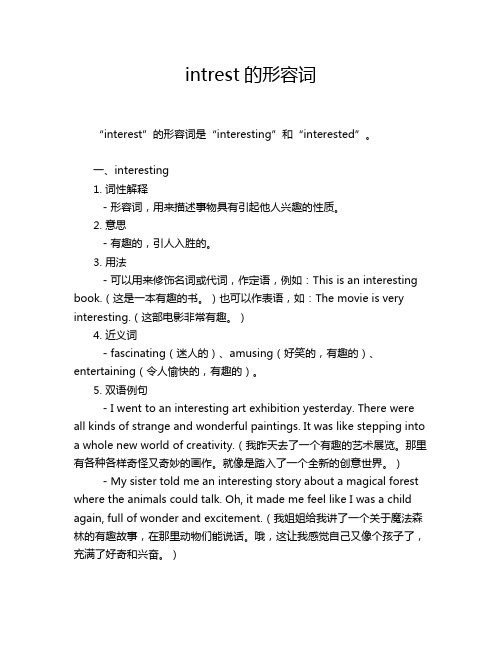
intrest的形容词“interest”的形容词是“interesting”和“interested”。
一、interesting1. 词性解释- 形容词,用来描述事物具有引起他人兴趣的性质。
2. 意思- 有趣的,引人入胜的。
3. 用法- 可以用来修饰名词或代词,作定语,例如:This is an interesting book.(这是一本有趣的书。
)也可以作表语,如:The movie is very interesting.(这部电影非常有趣。
)4. 近义词- fascinating(迷人的)、amusing(好笑的,有趣的)、entertaining(令人愉快的,有趣的)。
5. 双语例句- I went to an interesting art exhibition yesterday. There were all kinds of strange and wonderful paintings. It was like stepping into a whole new world of creativity.(我昨天去了一个有趣的艺术展览。
那里有各种各样奇怪又奇妙的画作。
就像是踏入了一个全新的创意世界。
) - My sister told me an interesting story about a magical forest where the animals could talk. Oh, it made me feel like I was a child again, full of wonder and excitement.(我姐姐给我讲了一个关于魔法森林的有趣故事,在那里动物们能说话。
哦,这让我感觉自己又像个孩子了,充满了好奇和兴奋。
)- That interesting little gadget on the table looks so cool. What do you think it does? Is it some kind of high - tech toy?(桌子上那个有趣的小玩意儿看起来好酷。
interest的用法归纳
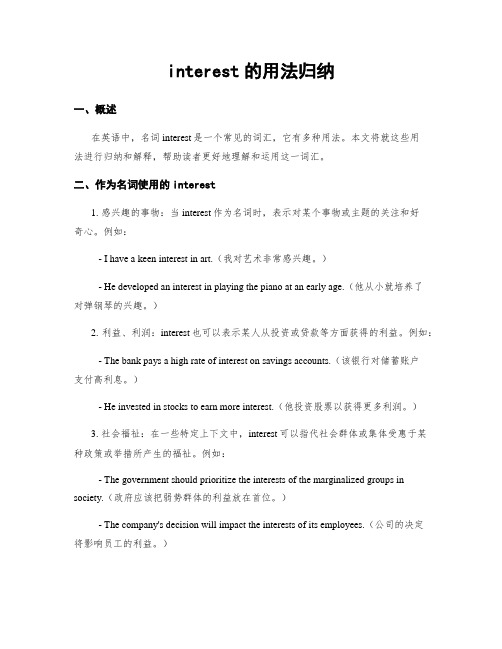
interest的用法归纳一、概述在英语中,名词interest是一个常见的词汇,它有多种用法。
本文将就这些用法进行归纳和解释,帮助读者更好地理解和运用这一词汇。
二、作为名词使用的interest1. 感兴趣的事物:当interest作为名词时,表示对某个事物或主题的关注和好奇心。
例如:- I have a keen interest in art.(我对艺术非常感兴趣。
)- He developed an interest in playing the piano at an early age.(他从小就培养了对弹钢琴的兴趣。
)2. 利益、利润:interest也可以表示某人从投资或贷款等方面获得的利益。
例如:- The bank pays a high rate of interest on savings accounts.(该银行对储蓄账户支付高利息。
)- He invested in stocks to earn more interest.(他投资股票以获得更多利润。
)3. 社会福祉:在一些特定上下文中,interest可以指代社会群体或集体受惠于某种政策或举措所产生的福祉。
例如:- The government should prioritize the interests of the marginalized groups in society.(政府应该把弱势群体的利益放在首位。
)- The company's decision will impact the interests of its employees.(公司的决定将影响员工的利益。
)4. 被追求或争议的事物:interest还可以指代引起公众关注或举起争议的事物。
例如:- The scandal generated a great deal of public interest.(那个丑闻引发了大量公众的关注。
interested用法
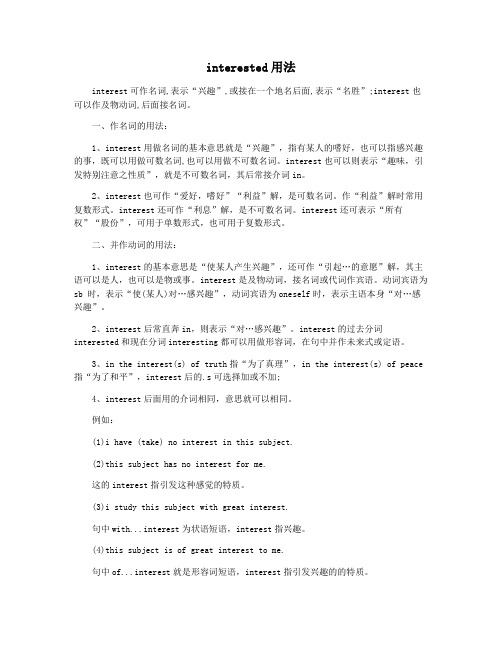
interested用法interest可作名词,表示“兴趣”,或接在一个地名后面,表示“名胜”;interest也可以作及物动词,后面接名词。
一、作名词的用法:1、interest用做名词的基本意思就是“兴趣”,指有某人的嗜好,也可以指感兴趣的事,既可以用做可数名词,也可以用做不可数名词。
interest也可以则表示“趣味,引发特别注意之性质”,就是不可数名词,其后常接介词in。
2、interest也可作“爱好,嗜好”“利益”解,是可数名词。
作“利益”解时常用复数形式。
interest还可作“利息”解,是不可数名词。
interest还可表示“所有权”“股份”,可用于单数形式,也可用于复数形式。
二、并作动词的用法:1、interest的基本意思是“使某人产生兴趣”,还可作“引起…的意愿”解,其主语可以是人,也可以是物或事。
interest是及物动词,接名词或代词作宾语。
动词宾语为sb 时,表示“使(某人)对…感兴趣”,动词宾语为oneself时,表示主语本身“对…感兴趣”。
2、interest后常直奔in,则表示“对…感兴趣”。
interest的过去分词interested和现在分词interesting都可以用做形容词,在句中并作未来式或定语。
3、in the interest(s) of truth指“为了真理”,in the interest(s) of peace 指“为了和平”,interest后的.s可选择加或不加;4、interest后面用的介词相同,意思就可以相同。
例如:(1)i have (take) no interest in this subject.(2)this subject has no interest for me.这的interest指引发这种感觉的特质。
(3)i study this subject with great interest.句中with...interest为状语短语,interest指兴趣。
名校版英语经典句型考点解析interesting与interested用法
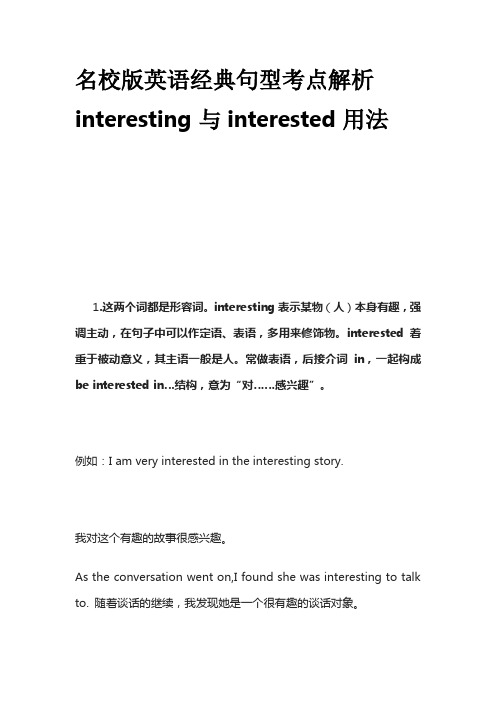
名校版英语经典句型考点解析interesting与interested用法1.这两个词都是形容词。
interesting表示某物(人)本身有趣,强调主动,在句子中可以作定语、表语,多用来修饰物。
interested着重于被动意义,其主语一般是人。
常做表语,后接介词in,一起构成be interested in…结构,意为“对……感兴趣”。
例如:I am very interested in the interesting story.我对这个有趣的故事很感兴趣。
As the conversation went on,I found she was interesting to talk to. 随着谈话的继续,我发现她是一个很有趣的谈话对象。
You can …play games,swim,meet interesting people.你可以……玩游戏,游泳,会见有趣的人。
She’s an iterseting writer,and I interested in the subjects that she writes about.她是一个有趣的作家,我对她写的题材很感兴趣。
2. be interested in sth(sb)be interested in doing sthbe interested to do sth某人喜欢、有趣、热衷于做某事;有兴趣做某事I'm very interested in history.我很喜欢历史。
I'm not interested in a romantic relationship.我对谈情说爱不感兴趣。
I am not really interested in politics.我并不真正热衷于政治。
Alex is not interested in girls yet.亚历克斯对女孩子还不感兴趣。
Now she's a teenager, she's starting to be interested in boys.她现在已经是个十几岁的姑娘了,开始对男孩子感兴趣。
interesting和interested的用法
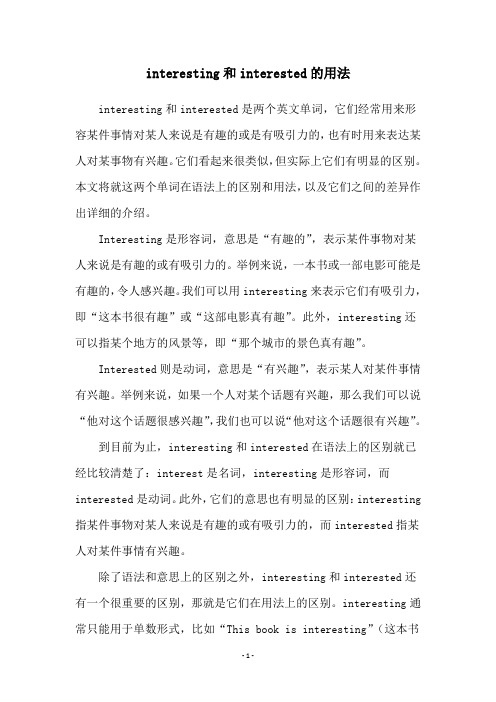
interesting和interested的用法interesting和interested是两个英文单词,它们经常用来形容某件事情对某人来说是有趣的或是有吸引力的,也有时用来表达某人对某事物有兴趣。
它们看起来很类似,但实际上它们有明显的区别。
本文将就这两个单词在语法上的区别和用法,以及它们之间的差异作出详细的介绍。
Interesting是形容词,意思是“有趣的”,表示某件事物对某人来说是有趣的或有吸引力的。
举例来说,一本书或一部电影可能是有趣的,令人感兴趣。
我们可以用interesting来表示它们有吸引力,即“这本书很有趣”或“这部电影真有趣”。
此外,interesting还可以指某个地方的风景等,即“那个城市的景色真有趣”。
Interested则是动词,意思是“有兴趣”,表示某人对某件事情有兴趣。
举例来说,如果一个人对某个话题有兴趣,那么我们可以说“他对这个话题很感兴趣”,我们也可以说“他对这个话题很有兴趣”。
到目前为止,interesting和interested在语法上的区别就已经比较清楚了:interest是名词,interesting是形容词,而interested是动词。
此外,它们的意思也有明显的区别:interesting 指某件事物对某人来说是有趣的或有吸引力的,而interested指某人对某件事情有兴趣。
除了语法和意思上的区别之外,interesting和interested还有一个很重要的区别,那就是它们在用法上的区别。
interesting通常只能用于单数形式,比如“This book is interesting”(这本书有趣),而不能用于复数形式,比如“These books are interesting”(这些书很有趣),应该改为“These books are interesting”(这些书都有趣)。
而interested则可以用于复数形式,比如“He is interested in these topics”(他对这些话题很感兴趣),不仅可以用于单数形式,还可以用于复数形式的情况。
- 1、下载文档前请自行甄别文档内容的完整性,平台不提供额外的编辑、内容补充、找答案等附加服务。
- 2、"仅部分预览"的文档,不可在线预览部分如存在完整性等问题,可反馈申请退款(可完整预览的文档不适用该条件!)。
- 3、如文档侵犯您的权益,请联系客服反馈,我们会尽快为您处理(人工客服工作时间:9:00-18:30)。
interest, interested, interesting用法介绍_用法辨析
一、interest用法
1. 用作名词,注意以下用法:
(1) 表示一般意义的兴趣爱好,为不可数名词,但可与不定冠词连用;表示在对的兴趣,其后通常接介词in。
如:
Youve no interest in going with us? 你没有兴趣和我们一道去?
Scientists have taken a great interest in his ideas. 科学家们对他的观点很感兴趣。
有时可用复数形式,表示不同人的兴趣或同一人的多种兴趣。
如:Their interests are very similar. 他们的兴趣很相似。
He has wide interests. 他有广泛的兴趣。
(2) 表示具体意义的感兴趣的事爱好,是可数名词。
如:
My interests are music and travel. 我的兴趣是音乐和旅行。
Gardening is one of my main interests. 园艺是我的主要兴趣之一。
(3) 注意以下各句介词of的使用:
The question is of great interest to me. 我对这个问题很感兴趣。
He has been to many places of interest. 他去过许多名胜。
(4) 表示利息,不可数。
如:
He paid 5% interest on the loan. 他借的贷款要付5%的利息。
(4) 表示利益,为可数名词,但通常用复数。
如:
Hes good at looking after his own interests. 他很会照顾自己的利益。
The union was formed to protect the rights and interests of miners. 建立起工会是为保护矿工的权利和利益。
2. 用作动词,是及物动词,通常以人作宾语。
如:
Geology interests him. 地质学使他感兴趣。
His joke didnt interest me. 他的笑话并不使我感到兴趣。
表示在某一方面的兴趣,与介词in搭配。
如:
He tried to interest me in football. 他设法使我对足球感兴趣。
二、interested 的用法
意思是:感兴趣的,关切的。
如:
Are you interested in this subject? 你对这门课感兴趣吗?
Arent you interested in making money? 难道你对赚钱不感兴趣?
Im interested in when he did it. 我对他什么时候干了此事感兴趣。
注意区别:be interested in doing sth与be interested to do sth:前者表示对做某事感兴趣,后者表示很想做某事:
Im interested to hear your opinion. 我想听听你的意见。
Im interested in emigrating to Canada. 我对移居加拿大感兴趣。
三、interesting的用法
意思是:有趣的,令人感兴趣的。
如:
The idea sounds interesting. 这个想法听起来很有趣。
I met a lot of interesting people on holiday. 我在度假期间遇到了许
多有趣的人。
The price is interesting to us. 我们对这一价格感兴趣。
It is interesting to contrast the two writers. 将这两位作家加以比较是很有意思的。
注意:其后接不定式且该不定式含有被动意义时,通常要用主动形式:
V olleyball is very interesting to watch. 打排球看起来很有意思。
She is interesting to talk to. 和她谈话很有意思。
四、辨析
interested 与interesting:前者表示感兴趣的,后者表示令人感兴趣的有趣的:
Children are interested in interesting stories. 孩子们对有趣的故事感兴趣。
